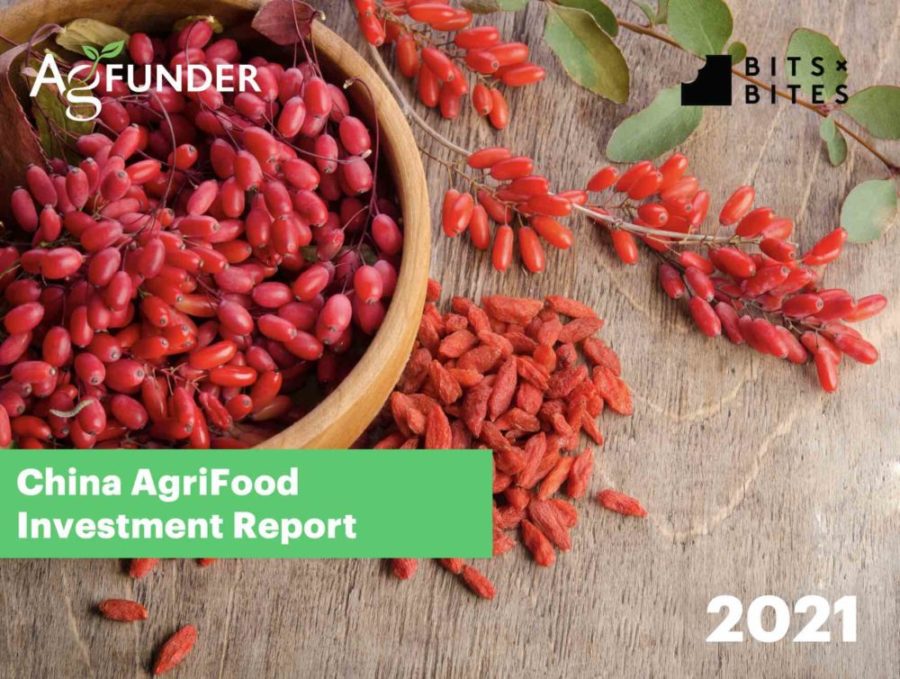Editor’s note: Winnie Leung is vice president at Bits x Bites, an agrifoodtech VC firm based in Shanghai, China. Jack Ellis is Asia-Pacific media & research lead at AgFunder and deputy editor of AFN.
Bits x Bites is an AgFunder data partner, providing data and insight on the Chinese market for AgFunder’s industry reports. AgFunder is AFN’s parent company.
AgFunder today releases the China 2021 Agrifood Startup Investing Report – the latest edition of its annual deep-dive on the latest foodtech and agtech trends in the world’s second-largest economy.
Overall, agrifoodtech funding in China rose 66% year-on-year in 2020 to reach $6 billion. This growth again underlines the agrifood sector’s resilience, considering that total private equity and VC funding across all sectors in China dropped by 50% from 2019 levels.
Join us for a discussion about the findings with Bits x Bites and other on Clubhouse on Thursday at 8am UK / 9am Central Europe / 3pm China / 5pm Australia Eastern here.
This partly reflects agrifoodtech’s growing appeal to state-owned and cross-sector investors, many of whom are pulling away from more general internet, media, and telecom investments to explore opportunities across the food supply chain.
Upstream investment is higher than it’s ever been
It will come as no surprise to AFN‘s regular readers that investment into downstream categories – that is, those startups directly serving the needs of the consumer – dominates China’s agrifoodtech ecosystem, accounting for just over three-quarters of overall funding in the space. Taken by itself, the eGrocery category – comprising companies selling produce and other groceries online and delivering them to consumers – raised $3.6 billion.
However, there are increasingly strong signals which suggest that more and more investment is heading upstream.
While it dominated in dollar terms, eGrocery saw just half the number of deals it did in 2019. This is indicative of the relative maturity of the category, with investors answering the high capital demands of its more established players. There is also an observed trend towards consolidation, as larger eGrocers seek to extend their reach across multiple regions of China.
In fact, in terms of deal numbers, downstream categories’ share decreased by almost 10% year-on-year as investors turned their attention upstream to technologies and solutions serving farms, food production, biotech, and mid-chain logistics.
Resilience, maturity, and big bets on what comes next: Read AgFunder’s global 2021 AgriFoodTech Investment report, here
In 2020, Chinese companies in upstream categories raised a total of $1.4 billion in funding, taking a 23.7% share of overall agrifood investment compared to 13.6% a year earlier. Chinese agtech also recorded its largest single funding round to date, with drone maker XAG raising a Series C extension of $174 million.
AgFunder’s research suggests that, beyond drones and robotics, farm management software is also beginning to gain traction in China. These agtech developments have been fueled in part by rapid consolidation of smallholder farms into larger scale, industrialized operations throughout the country.
BASF is one of the investors that has participated in China agtech deals. The German chemicals giant backed SmartAHC, a digital solutions provider for pig farming.
“Farm consolidation has been great news for China’s agritech startups, since larger farm scale and more buying power promote technology implementation,” said Li Li, senior investment manager at BASF.
“We’re just starting to skim the surface.”
Rise in wellness priorities and in-home indulgence persist beyond the epidemic
Covid-19 led to relatively short-lived disruptions to the daily lives of Chinese consumers. But many of the behavioral shifts that it caused are here to stay.
Besides eGrocery, the pandemic accelerated spending on health-related foods, particularly conscientious indulgences like guilt-free snacking and low-sugar confectionery.
Alt-protein companies harnessed this momentum to raise $127 million. These startups are trying to convince consumers to switch to meat and dairy replacements, often by marketing them as healthier options.
“China’s market for protein alternatives is absolutely massive,” said Michael Zuo, a partner at Matrix Partners China. His firm invested in three alt-protein startups last year, including Starfield.
“We are witnessing a rapid expansion across the supply chain. The timing is optimal for protein investment in China.”
Biotech: The one to watch
The Ag Biotech category grew from just three deals in China in 2019, to 25 in 2020. The largest of these was a $116 million pre-IPO round raised by CapitalBio Technology, which develops food safety and molecular breeding solutions.
China also saw its first synbio IPO last year with the listing of Cathay Biotech, which produces bio-based chemical intermediaries. Along with other Chinese biomanufacturing upstarts such as Mojia Bio, the rise of these companies can be traced back to China’s policy drivers. [Disclosure: Mojia Bio is a Bits x Bites portfolio company.]
In recent years, the Chinese government has increasingly tightened environmental protections, leading to soaring compliance costs for traditional chemical manufacturers. Along the way, this has created opportunities for emerging companies developing bio-based alternatives for high-demand chemical substances and ingredients.
“There is no question the ground is shifting. The types of triggers lifting agtech are doing the same in biotech,” said Matilda Ho, founder and managing director at Bits x Bites.
“We expect to see more talent coming to the biotech sector, whether in ag biotechnology, cellular agriculture, animal and human nutrition, ingredients, or biodegradable materials. Everywhere you look, forces are pushing China’s agrifood ecosystem forward, pulling in new startups, and drawing cross-sector investors.”





